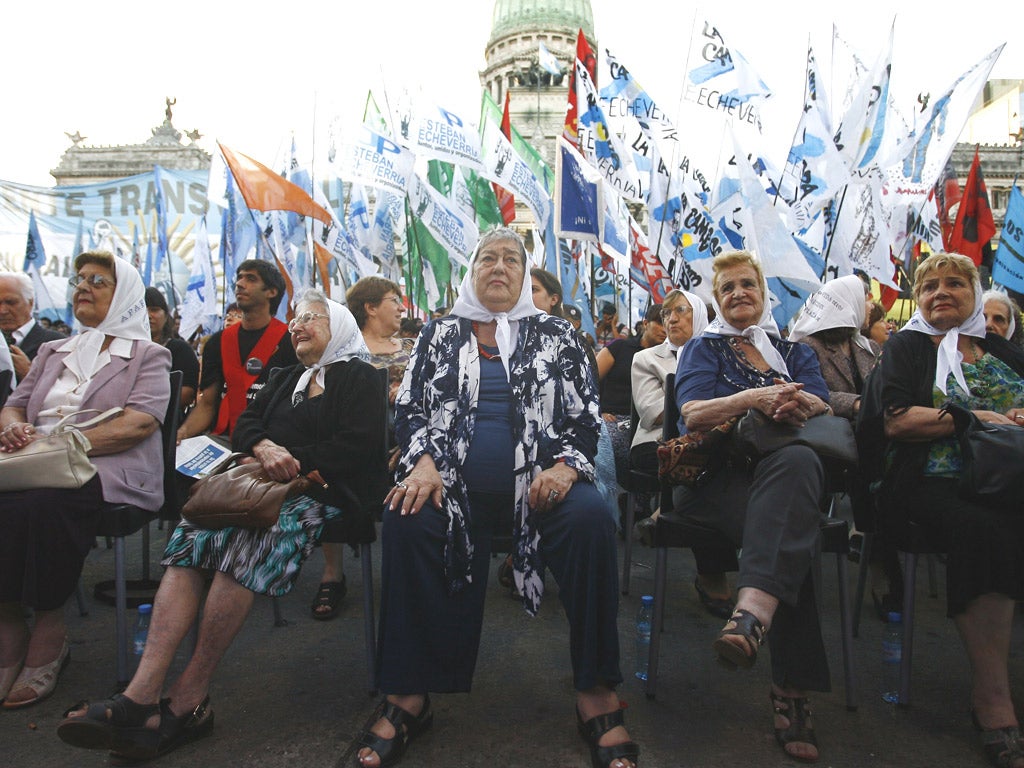The Mothers of the Disappeared beset by corruption scandal

Few opposed Argentina's military dictatorship as effectively as the Mothers of the Plaza de Mayo, with their lonely, dignified vigils in Buenos Aires' main square for their children "disappeared" by the junta. But now the group, whose moral authority in the country was virtually saintly, has become embroiled in a corruption scandal that threatens to tarnish its reputation for good.
At the centre of the storm is one of Argentina's most controversial characters, Sergio Schoklender, the group's former financial administrator. Despite a lifetime of left-wing activism, Schoklender, 53, remains best known in his homeland for his involvement in a double murder that rocked Argentina.
In the early hours of 30 May, 1981, Schoklender and his younger brother Pablo bludgeoned their parents, Mauricio and Cristina, to death. Sergio spent 14 years behind bars, qualifying as a lawyer and a psychologist.During that time, he met Ms de Bonafini, now 83, and the two activists soon formed a deep bond. "She is like a mother to me," he once said. But now the friendship has turned into a public falling out, as Schoklender, the daughter of the daughter of the Mothers' main driving force, Hebe de Bonafini and 65 others are the subjects of a massive criminal investigation. The probe focuses on the alleged misuse of 765 million pesos (£112m) of taxpayers' money handed to the Mothers under a government contract to build social housing, in a scheme launched in 2008 and known as Shared Dreams.
According to prosecutors, roughly £7.5m ended up in Schoklender's personal accounts. The list of charges faced by he and the other accused includes money laundering, fraud, falsifying documents and conspiracy. "Sergio Schoklender is a traitor and a thief," Hebe de Bonafini said recently.
Claiming he is being made a scapegoat, Schoklender has threatened to reveal details of widespread corruption within the ruling Peronist party of Cristina Kirchner and her late husband Nestor, who preceded her as president.
He insists housing built under Shared Dreams was both cheaper and of a better quality than that of rival contractors. But he also claims that it was impossible to implement state contracts without becoming involved in the corruption that plagues Argentina and which, he says, has worsened during the Kirchners' time in power.
Despite the obvious self-interest in Schoklender's claims, they are being taking seriously in Argentina, possibly due to a reputation for cronyism attached to Mr Kirchner's rule.
There have also been questions about why the authorities did not act against the alleged fraud much earlier. Teodoro Cervo, writing in the newspaper Clarin, said: "Not just did governors, ministers, secretaries and bosses of all kinds listen to Sergio Schoklender, but they applauded and congratulated him whenever the opportunity arose."
In the end, no matter how the criminal trials play out, the Mothers of the Plaza de Mayo have already been badly tarnished by the mushrooming scandal. Many ask why a group originally set up to campaign for justice for victims of the so-called "dirty war" carried out by the military dictatorship should now be involved in social housing projects and other poverty alleviation schemes.
With criminal trials looming, Argentines are bracing themselves for yet more revelations about how one of the country's most respected institutions, run by mothers whose sons and daughters made the ultimate sacrifice for Argentine democracy, managed to so badly lose its way.
Join our commenting forum
Join thought-provoking conversations, follow other Independent readers and see their replies
Comments
Bookmark popover
Removed from bookmarks